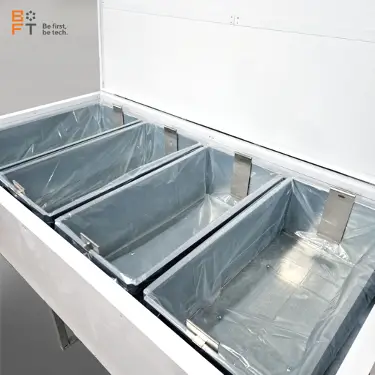Ice is not just frozen water; it’s a staple in beverages, essential for food preservation, and a critical component in various industrial processes. However, the simplicity of ice belies the complexity of its production, particularly when ensuring both quality and safety. With advancements in technology, modern clear ice block machines play a pivotal role in meeting stringent standards. But what exactly makes these machines so crucial in the ice production industry? Let’s break it down in a way everyone can understand.
What are Clear Ice Block Machines?
Clear ice block machines are specialized devices designed to produce visually appealing and high-quality ice, free from impurities and air bubbles. These machines operate on the principle of directional freezing, which allows water to freeze slowly and uniformly, pushing air and impurities to one area, usually the bottom, which is later removed. Unlike traditional ice makers that freeze water from all sides, clear ice machines freeze from one direction, resulting in crystal-clear blocks. The technology behind these machines often includes advanced water filtration systems to ensure the water used is as pure as possible before freezing. This process not only enhances the aesthetic quality of the ice but also improves its melting behavior, making it last longer in beverages without diluting them quickly. Many clear ice machines are designed for commercial use in bars, restaurants, and events where presentation is key, but there are also models available for home use. The clear ice produced is not only favored for its beauty but also for its practicality, as it provides a slow-melting, flavor-preserving addition to drinks.
Importance of Quality in Ice Production
The importance of quality in ice production cannot be overstated, as it directly affects both the safety and satisfaction of consumers. High-quality ice must be free from contaminants such as bacteria and impurities, which can pose health risks if not properly managed. In settings like restaurants, the clarity and purity of ice are crucial, as it comes into direct contact with food and beverages. Additionally, the density and structure of well-produced ice ensure that it melts slower, thereby preserving the integrity and flavor of drinks for a longer period. Quality ice production also minimizes the risk of equipment damage, as pure, clear ice is less likely to cause blockages and wear in ice machines and dispensers. Furthermore, consistent quality in ice production helps businesses uphold their reputation for excellence, attracting and retaining customers who expect the best in their food and drink experiences. Therefore, investing in advanced ice production technology and strict quality control measures is essential for any business that uses ice extensively.
Safety Standards in Ice Production
Safety standards in ice production are critical to ensuring that the ice consumed or used in various applications is safe and free from health hazards. These standards often involve strict regulations on the source of water used, requiring it to be potable and free from harmful contaminants before it even enters the ice-making process. Additionally, the equipment used for ice production must adhere to food-grade safety requirements to prevent the introduction of toxins during the freezing process. Regular inspections and maintenance of ice machines are mandatory to avoid the buildup of mold and bacteria which can compromise ice quality. Safety protocols also include proper handling and storage of ice, ensuring that it is not exposed to cross-contamination with other food products or harmful substances. Training for personnel involved in ice production and handling is another crucial aspect, equipping them with knowledge on hygiene practices and emergency procedures. Ultimately, adherence to these safety standards helps prevent foodborne illnesses and maintains consumer trust in products that involve ice, such as beverages and perishable goods.
Role of Modern Machines in Ensuring Quality
Modern machines play a pivotal role in ensuring the quality of ice production, employing advanced technologies to meet high standards. These machines incorporate sophisticated filtration systems that remove impurities and minerals from water before freezing, ensuring that the ice produced is not only clear but also free of tastes and odors. The precise control systems in modern ice machines allow for consistent production conditions, which is crucial for maintaining uniformity in ice texture and size. This consistency is vital in industries such as hospitality, where ice quality can directly impact service. Additionally, modern ice machines are equipped with automated cleaning cycles that help prevent the buildup of bacteria and scale, which can compromise ice quality and machine performance. Energy efficiency is another focus of contemporary ice machines, with many models designed to use less water and power, which indirectly supports quality by reducing the environmental stressors that can affect water supply and purity. Through these advanced functionalities, modern ice machines not only uphold but often exceed the required standards for ice quality, making them indispensable in today’s market.
How to Choose the Right Ice Machine
Choosing the right ice machine requires careful consideration of several factors to ensure it meets your specific needs. First, determine the volume of ice you need based on the size of your operation; restaurants, bars, and healthcare facilities will likely need machines that can produce a large amount of ice quickly. Consider the type of ice required, such as cube, nugget, or flake, as different ice forms are suited for different applications—cube ice is standard for drinks, while flake ice is better for buffets. Evaluate the water quality in your area; in regions with hard water, look for machines with built-in water filtration systems to prevent scale build-up and maintain ice clarity. Energy efficiency is another crucial factor; choosing an ENERGY STAR-rated ice machine can reduce operating costs and help in environmental conservation. The machine’s footprint and installation requirements should also be considered to ensure it fits within your designated space without requiring extensive modifications. Lastly, assess the ease of maintenance and cleaning of the machine, as regular upkeep is vital for longevity and consistent performance of the ice machine.
In conclusion, understanding and utilizing modern clear ice block machines is essential for ensuring high-quality, safe, and aesthetically pleasing ice that meets both consumer expectations and stringent industry standards.
Disclosure: This article may contain affiliate links, meaning we could earn a commission if you make a purchase through these links.







